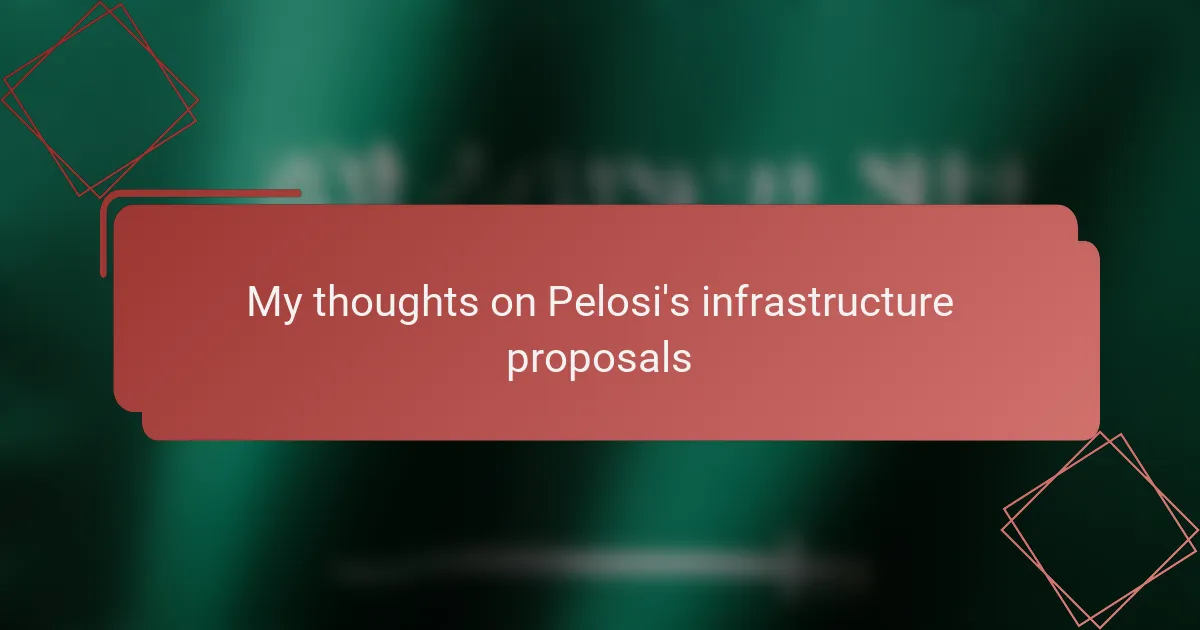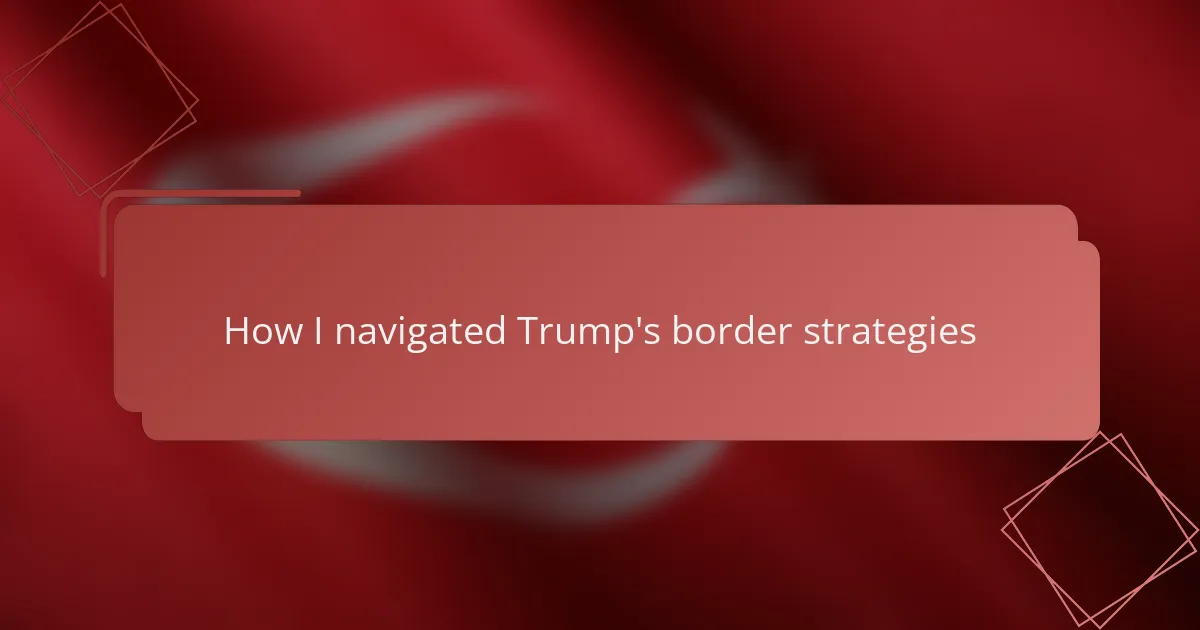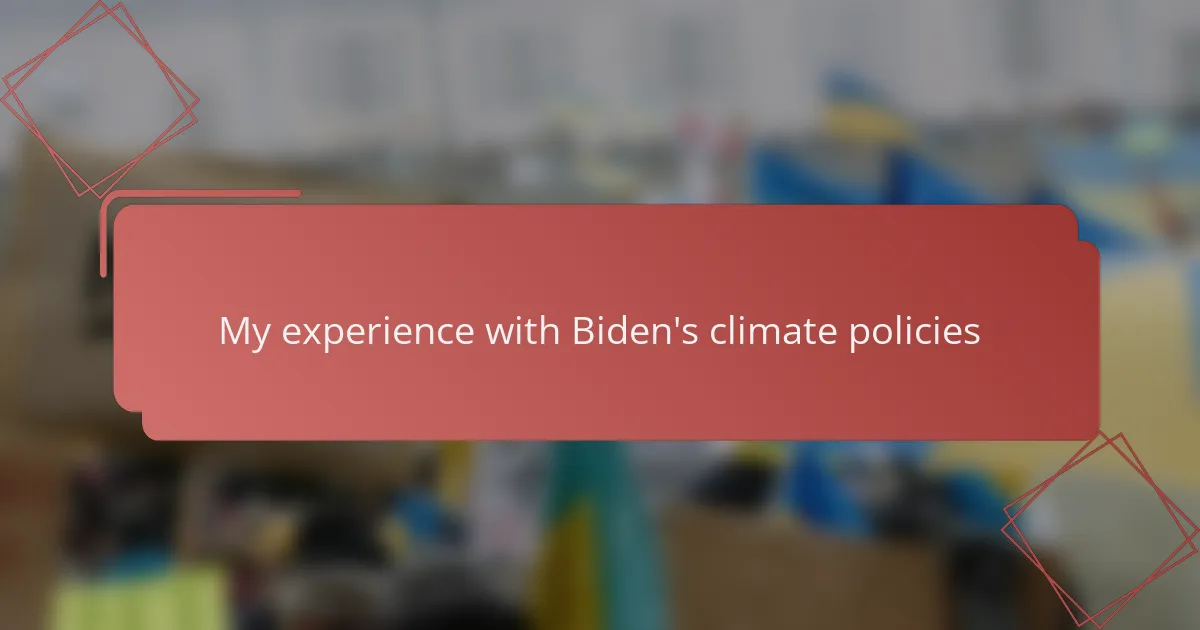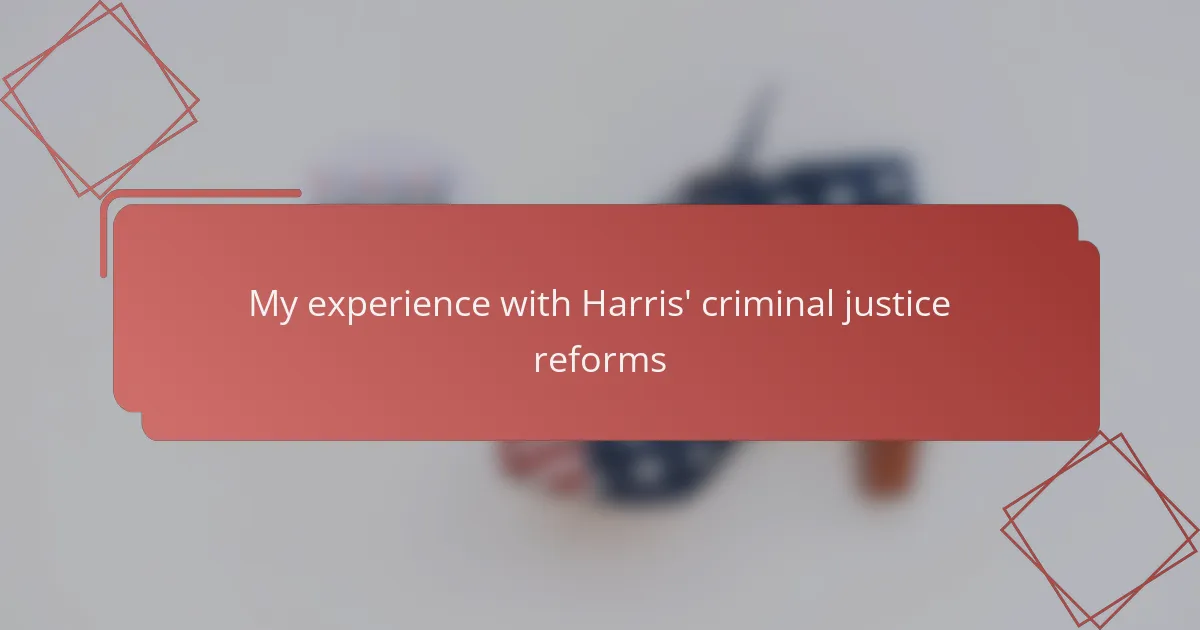Key takeaways
- Political satire uses humor, exaggeration, and irony to expose underlying truths in political discourse, prompting deeper reflection on issues such as policy effectiveness.
- Pelosi’s infrastructure proposals aim to balance traditional infrastructure needs with progressive goals, targeting road improvements, clean energy, and job creation.
- Satire reveals the disconnect between political promises and real-world outcomes, highlighting the complexity and bureaucracy often associated with infrastructure plans.
- Effective satire resonates by blending humor with critical insights, encouraging audiences to question political rhetoric and engage in meaningful conversations.
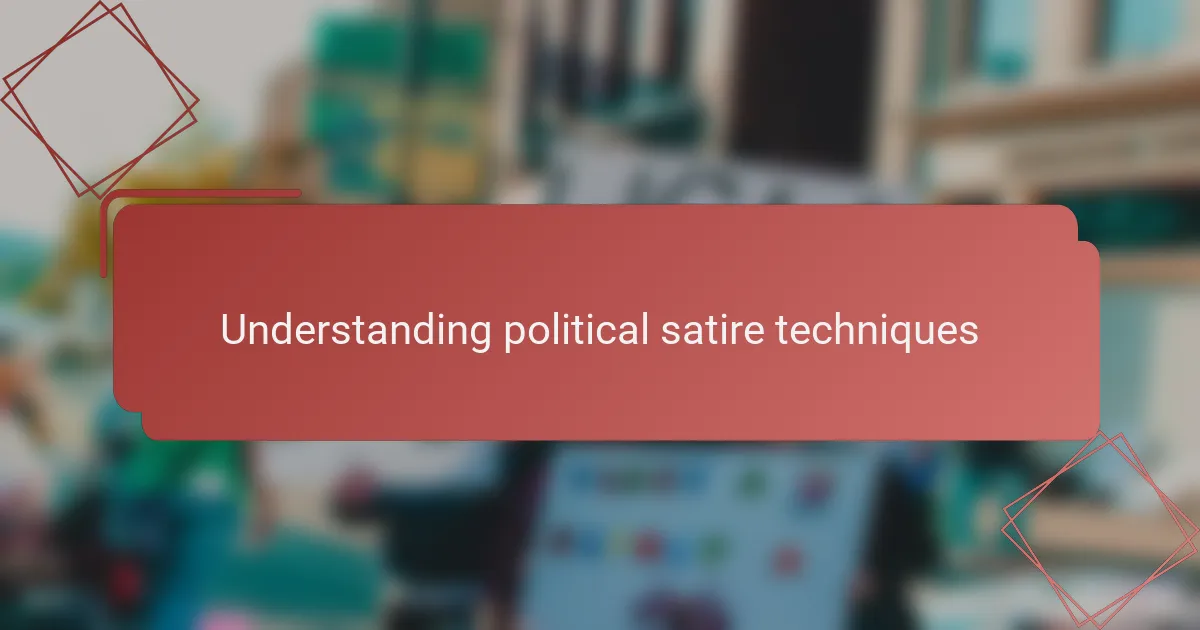
Understanding political satire techniques
Political satire thrives on exaggeration and irony, tools that I’ve found essential when trying to unpack complex political issues. Have you ever noticed how a simple twist of a politician’s words can reveal so much more than a straightforward report? That’s the power of satire—it strips away the surface to expose underlying truths, often leaving you both amused and deeply contemplative.
From my experience, effective satire isn’t just about mocking but about making you pause and question what you think you know. It uses humor as a lens, challenging our assumptions and prompting us to see policies and personalities in a new, often uncomfortable light. Isn’t that uncomfortable feeling exactly what keeps satire sharp and relevant?
What’s fascinating is how satire blends subtlety with boldness—sometimes a sly remark hits harder than a direct critique. I often find myself reflecting on how this balance shapes public discourse, making satire a unique form of political commentary that both entertains and educates without preaching. Have you ever caught yourself laughing, only to realize the joke was a serious point? That’s when satire works its magic.
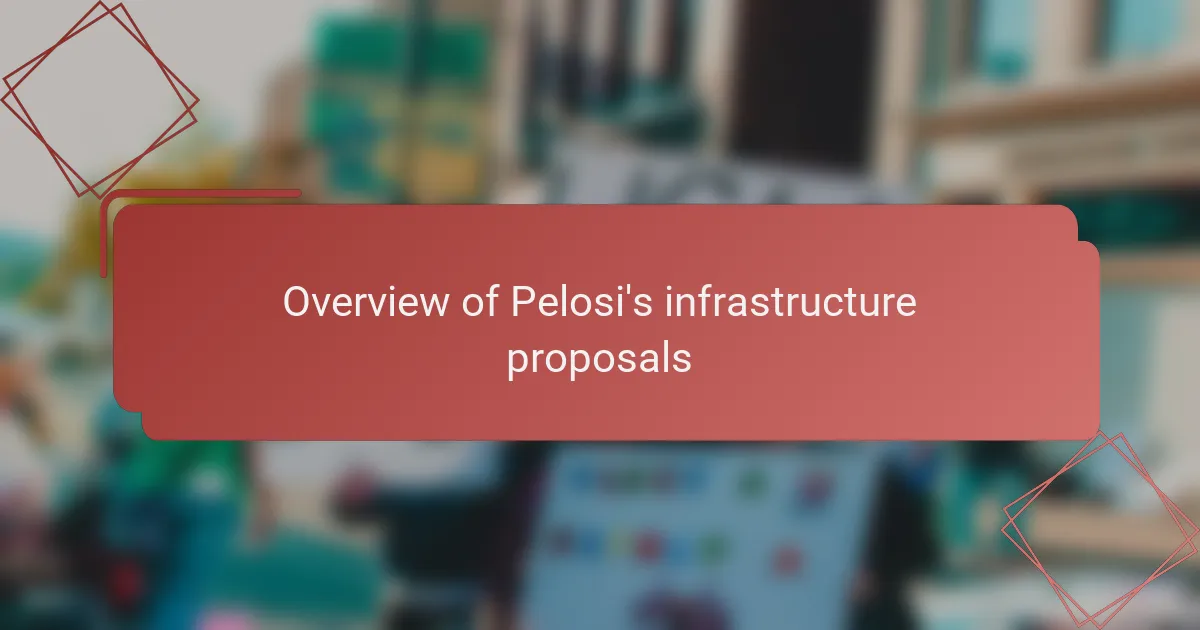
Overview of Pelosi’s infrastructure proposals
Pelosi’s infrastructure proposals are ambitious, aiming to address everything from roads and bridges to clean energy and broadband expansion. I found it striking how the plan tries to balance traditional infrastructure needs with progressive goals, which feels like juggling two very different balls at once. It reminds me of trying to renovate an old house while also insisting on installing the latest smart home tech—both necessary, but tricky to coordinate.
| Aspect | Pelosi’s Proposal |
|---|---|
| Funding | Approximately $2 trillion over 10 years |
| Main Focus | Roads, bridges, clean energy, broadband |
| Job Creation | Millions of jobs, especially in construction and green energy sectors |
| Environmental Goals | Significant emphasis on reducing carbon emissions and promoting sustainability |
| Comparative Ambition | Broader and more progressive than traditional infrastructure bills |
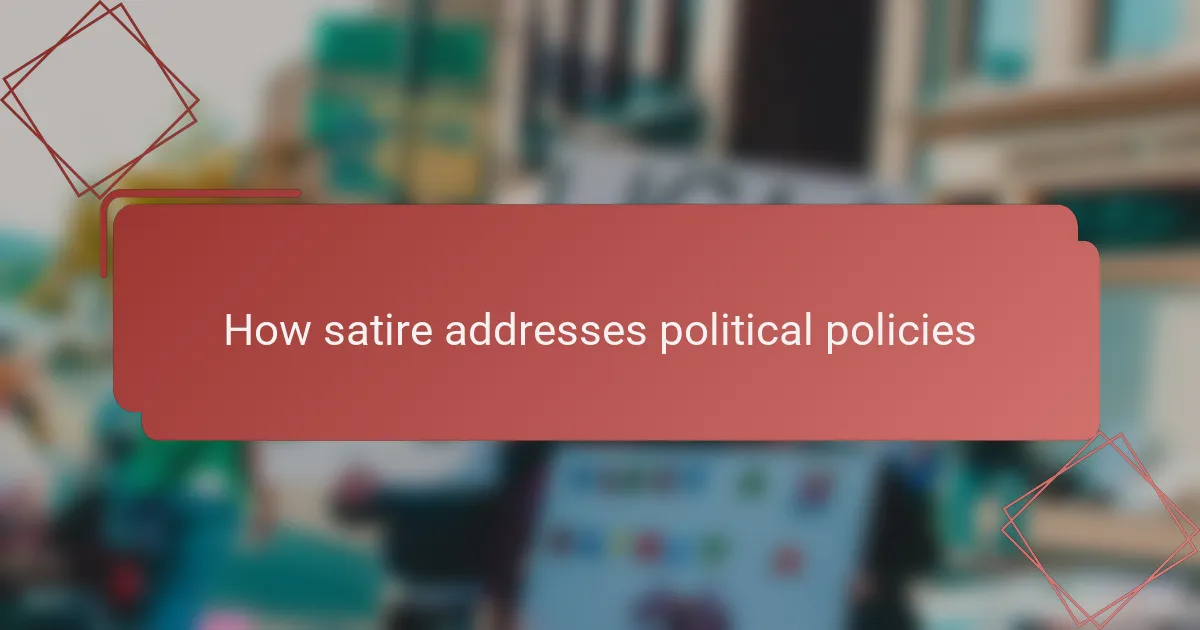
How satire addresses political policies
Satire often shines a light on political policies by exaggerating their complexities or contradictions, making them more accessible and thought-provoking. When I first encountered satirical takes on Pelosi’s infrastructure proposals, I found that humor helped me unpack the dense legislative language, turning frustration into a moment of clarity.
In my experience, satire doesn’t just entertain—it provokes a deeper reflection on the promises and pitfalls of political agendas. It’s like seeing the same story from a new, sharper angle that reveals hidden truths or ironies. Here’s how satire typically tackles political policies:
- Highlights contradictions between stated goals and actual outcomes
- Exaggerates bureaucratic jargon to expose inefficiency
- Uses irony to question the sincerity of political promises
- Simplifies complex issues to make them understandable and relatable
- Amplifies public skepticism or support through humor
- Invites audiences to critique rather than passively accept policies
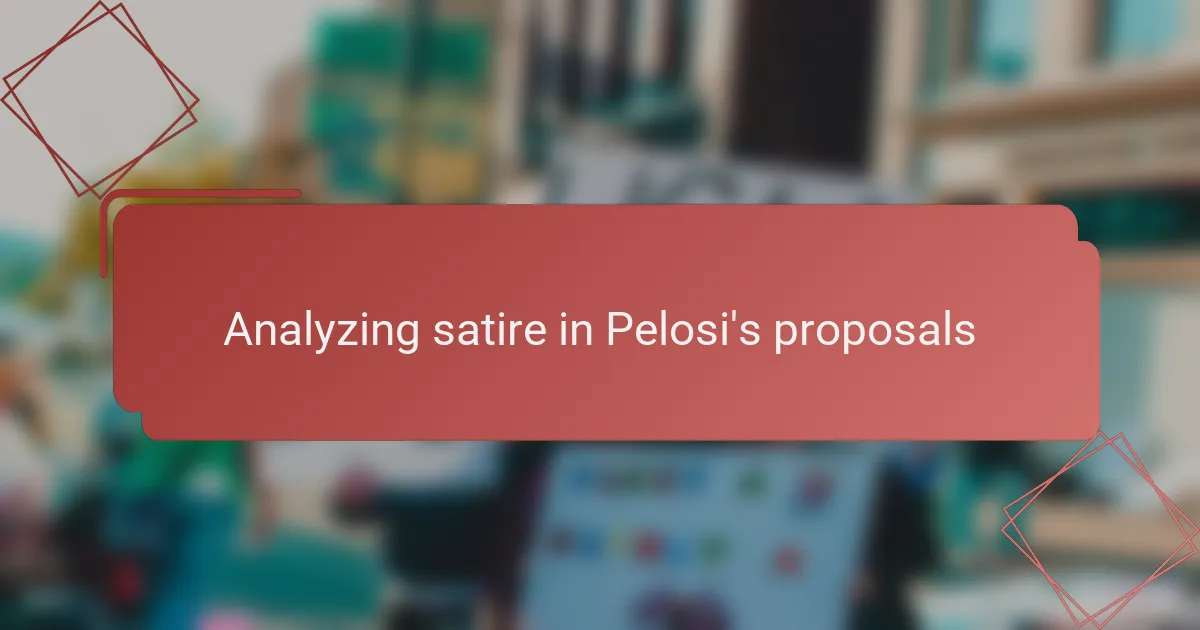
Analyzing satire in Pelosi’s proposals
Satire aimed at Pelosi’s infrastructure proposals often plays with the sheer scale and ambition of the plan, turning what might be seen as earnest intentions into almost caricatured grandiosity. I’ve noticed how satirists zoom in on the tension between lofty environmental goals and the practical challenges of such a massive rebuild—does this create hope or just set the stage for inevitable political gridlock? It’s this push-and-pull that makes the satire both entertaining and a subtle critique of political reality.
What really strikes me is how satire uses Pelosi’s mix of traditional and progressive priorities to highlight contradictions—like trying to appeal to both pragmatic voters and environmental activists simultaneously. From my perspective, the humor lies in exposing how this balancing act often seems more like political theater than a coherent strategy. Have you ever caught yourself laughing at these portrayals, only to wonder if the joke is on all of us, stuck waiting for those promises to materialize?
I also appreciate how satire gives voice to the frustration many feel when confronted with bureaucratic language that feels designed to confuse rather than clarify. I remember reading one piece that mocked the endless jargon surrounding “broadband expansion” as a Kafkaesque maze—suddenly, the dense policy sheets became something I could relate to, because humor made the distance between elected officials’ grand speeches and everyday realities glaringly obvious. Isn’t that the hallmark of good satire? It invites us not just to laugh but to think critically.
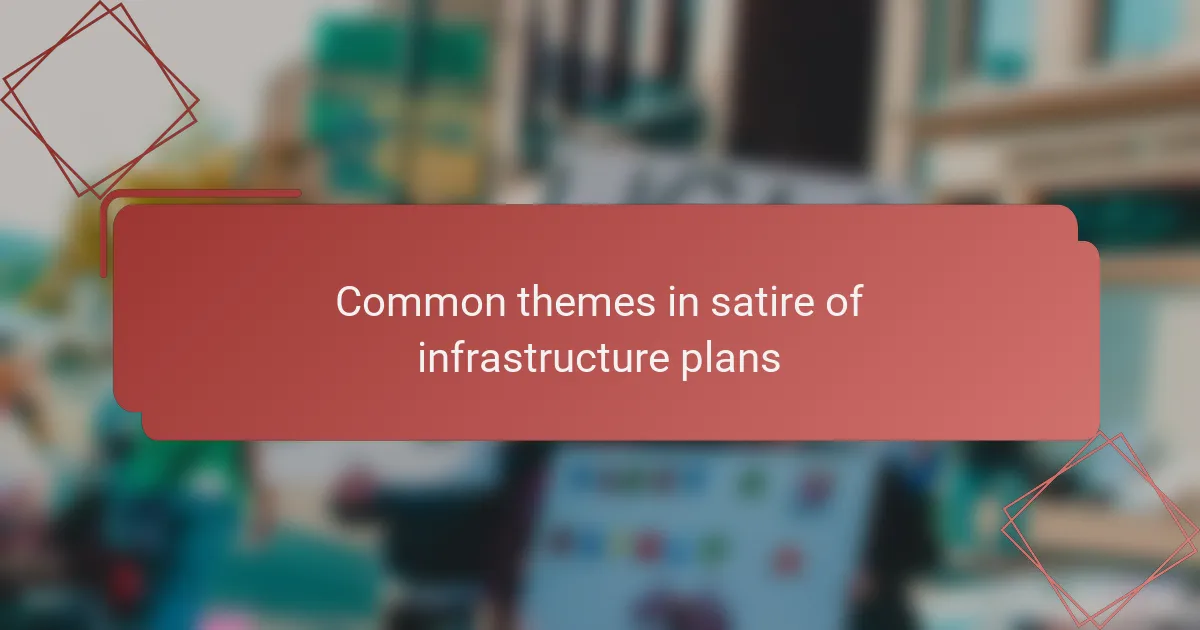
Common themes in satire of infrastructure plans
Satire around infrastructure plans often hones in on the gap between grand promises and messy realities. I remember when a major proposal was touted as a “game-changer,” only for jokes to flood social media about endless potholes and stalled projects. This disconnect fuels a lot of the humor and frustration I see.
Another theme is the exaggerated complexity and bureaucracy behind these plans. It’s common for satirists to mock how endless committees and red tape seem to slow progress, turning something supposedly straightforward into a never-ending saga.
- Over-the-top delays and missed deadlines
- Inflated budgets and accusations of wastefulness
- Ridiculous or impractical project ideas
- Political grandstanding overshadowing actual goals
- Confusing jargon and buzzwords
- Public skepticism and cynicism about outcomes
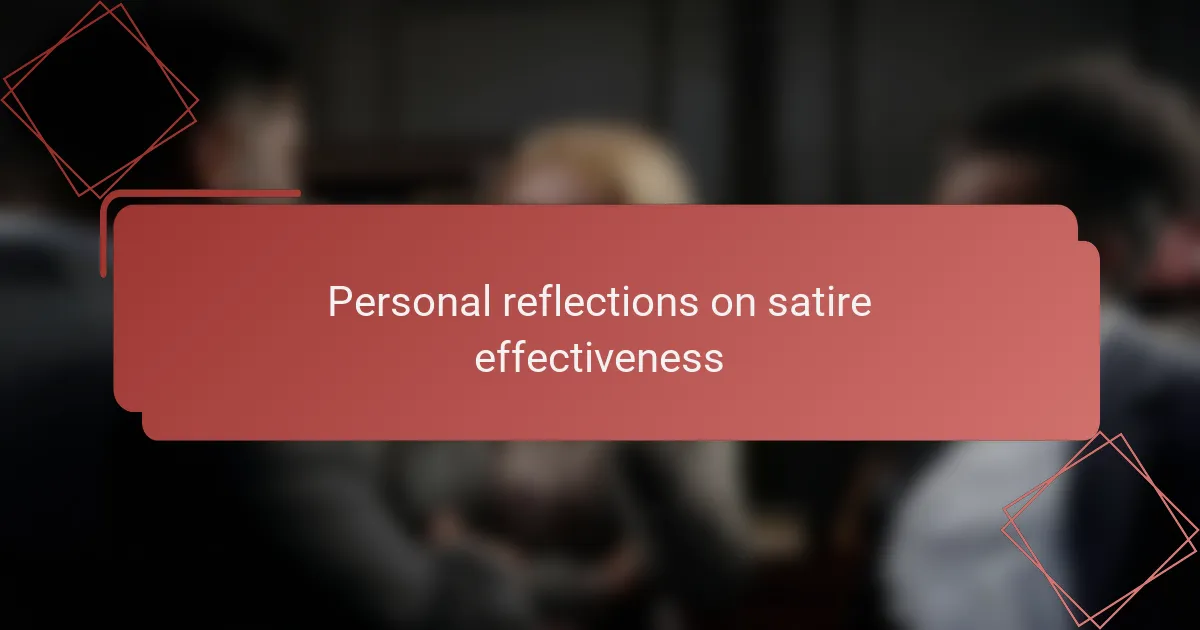
Personal reflections on satire effectiveness
Satire has always been a powerful tool to unravel the complexities and contradictions of political proposals like Pelosi’s infrastructure plans. From my experience reading and writing political satire, I’ve noticed that the sharpness of the humor often reflects how well the satire captures the disconnect between political rhetoric and reality. When satire hits the mark, it doesn’t just entertain—it provokes a deeper reflection on the promises versus the outcomes of such proposals.
I remember coming across a satirical piece that joked about the “infrastructure bill” including a proposal to build bridges to nowhere, which at first made me chuckle but then left me unsettled. It’s moments like these that show satire’s dual function—to make us laugh and then question the sincerity and effectiveness of political initiatives. Effectiveness in satire, in my view, hinges on its ability to blend humor with critical insight without alienating those it intends to engage.
- Satire’s impact grows when it highlights discrepancies in political messaging.
- Personal connection to satire often comes through relatable hyperboles or exaggerations.
- Effective satire encourages readers to think critically about policy claims.
- Emotional responses to satire can vary from amusement to frustration or even disillusionment.
- The best satire leaves a lingering question, sparking conversations beyond the humor.
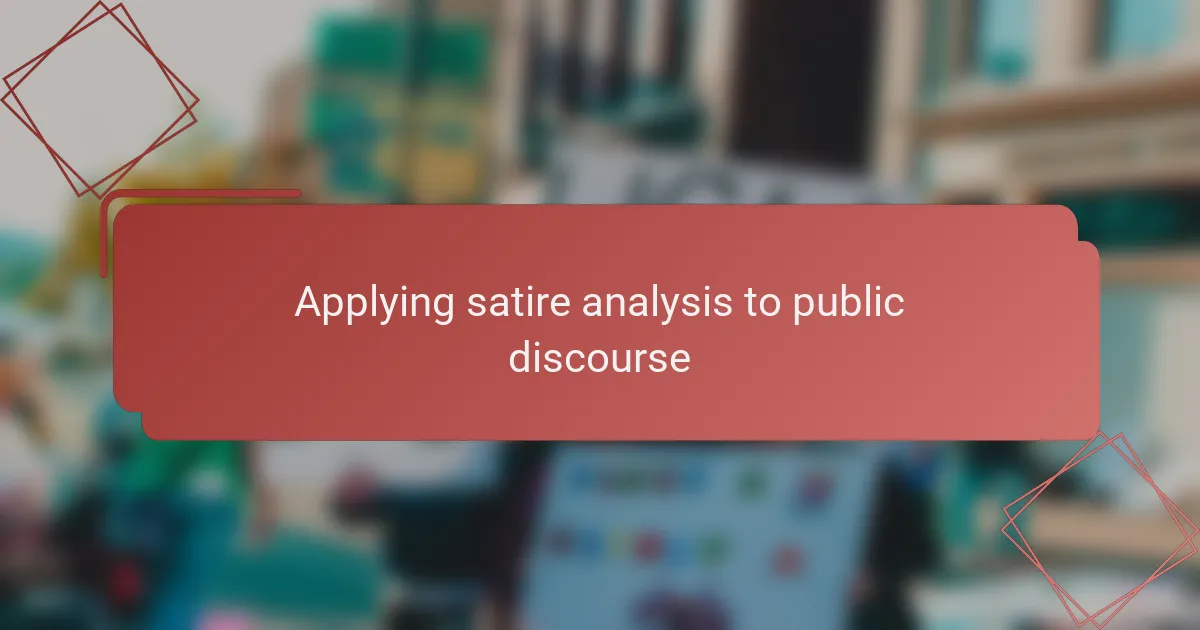
Applying satire analysis to public discourse
Applying satire analysis to public discourse reveals how political narratives, like Pelosi’s infrastructure proposals, often blend serious policy with exaggerated critique. From my experience, satire helps unpack the layers of meaning and exposes the contradictions that straightforward reporting might miss. It’s fascinating how humor can disarm heated debates, making complex issues more accessible while encouraging critical thinking about political motives.
| Aspect | Satire Analysis Perspective |
|---|---|
| Public Perception | Satire highlights both support and skepticism, showing how Pelosi’s proposals are simultaneously championed and mocked. |
| Emotional Response | Satire evokes humor and frustration, reflecting my own conflicted feelings about political grandstanding vs. practical outcomes. |
| Policy Focus | Satire often exaggerates the scope and impact, revealing public doubts about the feasibility and sincerity of infrastructure plans. |
